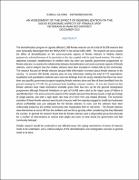| dc.description.abstract | The demobilization program in Uganda affected 1,389 female veterans out of a total of 36,358 veterans that were honorably discharged from the NRA/UPDF in the period 1992-1995. The research set out to assess the effect of demobilization on the socio-economic aspects of female veterans in Wakiso district purposively selected because of its proximity to the city coupled with its rural based location. The study’s objectives included: establishment of whether there has been any specific government programmes on female veterans; to examine the relationship between demobilization and socio-economic aspects of female veterans, and to analyze how the civilian veterans have been accepted in civilian life by the community. The research focused on female veterans because little information is known about female veterans in the country. It covered 160 female veterans plus ten key informants making the total of 170 respondents. Qualitative and quantitative methods were used and findings from the study indicated that there has never been any specific government program targeting female veterans alone and few of them benefited from the general training by UVAB, the government body handling veterans’ matters. It was also found out that female veterans have made themselves invisible given their low turn up for the general reintegration programmes although financial limitations on part of UVAB were cited as the major cause of failure to specifically them. The socio-economic aspects of the sample represent low literacy levels, a high percentage of single parents, and with a high death rate most of it from HIV and related illnesses. The economic activities of these female veterans were found to be poor with the majority engaged in small size businesses whose profitability was just adequate for the female veterans to exist, and the veterans have been unfavorably treated by the civilian community who marginalize them in real terms. The female veterans view themselves as worse off than the civilians and see this as grossly unfair considering that they liberated the country. In general the research found that the female veterans were a disgruntled group that advocate for a number of interventions to reverse their plight and have no kind words for government and feel community betrayal.
Similar research should be conducted in war affected areas; the coping mechanisms of wives of veterans needs to be undertaken; and a critical analysis of the demobilization and reintegration exercise in general needs to be done. | en_US |

